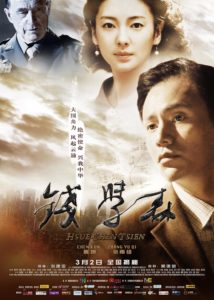Dr. Qian Xuesen
钱学森
China, 2012, colour/b&w, 2.35:1, 98 mins.
Director: Zhang Jianya 张建亚.
Rating: 6/10.
Above-average biopic of the father of China’s missile programme.
China, 1947. On a visit to Shanghai, Qian Xuesen (Chen Kun), who has been working in the US for the past 12 years as a research professor at Califoria Institute of Technology, as well as an advisor to the US Air Force on its jet propulsion programme, proposes to and marries his childhood sweetheart, opera singer Jiang Ying (Zhang Yuqi). The following year, their son Qian Yonggang is born in Boston, and they subsequently settle down in Pasadena, becoming director of Caltech’s Jet Propulsion Center. Soon afterwards, however, under the Red Scare, Qian is accused of being a Communist spy, has his security clearance revoked, and is arrested and imprisoned. In 1950 he is found not guilty, but he has already decided to leave the US and return to China. However, the US military is unwilling to let him go because of his knowledge. In early 1951 he is put under house arrest, and is only allowed to leave the US in 1955, as a swap for 11 American POWs captured by China during the Korean War. In China he is put in charge of the country’s missile programme which, after several setbacks including the Soviet Union withdrawing its advisors, eventually climaxes in the test of China’s first nuclear missile in Oct 1966.
REVIEW
A tribute to the father of China’s missile programme and the de facto initiator of its later space programme, Dr. Qian Xuesen 钱学森 pretty much follows the standard template of official Mainland biopics, with chunks of history, plenty of datelines and a light dusting of the subject’s personal life knitted into a heroic narrative. But with Huang Jianxin 黄建新 as producer and Zhang Jianya 张建亚 as director, it’s several cuts above the traditional plod on both script and acting levels, as well as on the technical side.
D.p. Zhi Lei 智磊, who worked with Zhang on the VFX spectacular Red Snow 极地营救 (2002), as well as comedies Call for Love 爱情呼叫转移 (2007) and Fit Lover 爱情呼叫转移II 爱情左右 (2008), brings a burnished sheen to the visuals, while Hong Kong’s Xu Hongyu 许宏宇 [Derek Hui], who worked with Huang on Beginning of the Great Revival 建党伟业 (2011), brings a smooth feel to the editing, which avoids choppiness despite the episodic structure. But Huang and Zhang’s contributions can be most felt in the un-starchy performances, the relatively unbombastic tone of the whole picture, and the mobile direction and use of good visual effects.
Again showing how official Mainland biopics have evolved in the modern age, the film is also cast with two youthful stars – romantic pin-up Chen Kun 陈坤 as the hero and Zhang Yuqi 张雨绮 (CJ7 长江7号, 2008; White Deer Plain 白鹿原, 2012) as his wife. Looking passably like the real Jiang Ying, Zhang tones down her usual lynx-eyed sensuousness and makes the wife role more than just a token part, while Chen, though shakey in his English dialogue and looking way too handsome for the part, goes acceptably through the motions as the scientist who responds to his homeland’s calling after being treated shamefully by the US during its Red Scare period. Other roles, such as the general of Lin Yongjian 林永健 and down-to-earth military type of Wu Yue 吴樾, are well drawn, and performances by western actors (whose names unfortunately are not given) are way above average for this type of production, especially those playing sympathetic Caltech president Lee DuBridge and bullish US Navy Undersecretary Dan A. Kimball.
Where the recent Sky Fighters 歼十出击 (2011) argued for China’s right to control of its own skies, and The Space Dream 飞天 (2011) for its place at the astro table, the message here is all about China having a nuclear missile capability and, through it, a say in world affairs – a message that won’t be lost on viewers given current China-US military relations. The movie is pitched on a less personal level than Space Dream, and is less involving emotionally, but it compensates with a portrait of an age (the 1950s) when the country was broke from the Korean War and and had to rely on its own limited resources and inventive thinking.
The film features often bold integration of documentary footage showing the real Qian, notably on his deathbed and at his 2009 funeral. But the most surprising footage is reserved for the end titles, where the real Qian is shown at an (unidentified) official gathering alongside writers Lao She and Ba Jin, plus opera legend Mei Lanfang.
CREDITS
Presented by Western Movie Group (CN), Television Art Centre of PLA General Armament Department (CN).
Script: Tao Chun, Chen Huaiguo. Shooting script: Sun Yian. Photography: Zhi Lei. Editing: Xu Hongyu [Derek Hui]. Music: Ma Shangyou. Art direction: Wu Jiakui. Costume design: Li Zhou. Sound: Yan Jun. Visual effects: Zhang Sheng (Beijing Zhengtong Yihe Culture & Art Exchange). Executive director: Zheng Chunyu.
Cast: Chen Kun (Qian Xuesen), Zhang Yuqi (Jiang Ying, Qian Xuesen’s wife), Xu Huanshan (old Qian Xuesen), Pan Hong (old Jiang Ying), Lin Yongjian (Nie Rongzhen, general), Wu Yue (Zhang Gongnong), Zhang Tielin (Mao Zedong), Liu Jin (Zhou Enlai), You Yong (Lv, minister), Lian Kai (Luo Youlai), Su Jin (Li Ping, Luo Youlai’s wife), Yang Buting (Liu Shaoqi), Chen Yiheng (Chen Geng), Sun Ning (base commander), Huang He, Gan Yu, Liu Guoguang, Lu Shiyu (specialists), Lv Xing (operation commander), Wang Dazhi (soldier), Lin Lin (weatherman), Zhang Enqi (Qian Yongzhen, Qian Xuesen’s daughter).
Release: China, 2 Mar 2012.
(Review originally published on Film Business Asia, 16 Mar 2012.)
